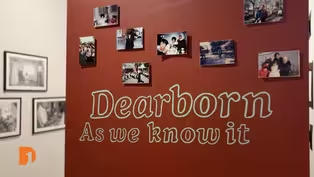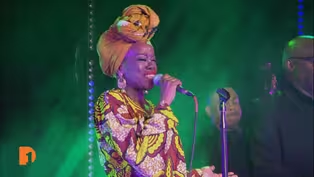
Destination Detroit initiative tells the region's story through people who shaped it
Clip: Season 10 Episode 1 | 6m 8sVideo has Closed Captions
A conversation about Detroit PBS’ Destination Detroit initiative
Destination Detroit, a Detroit PBS initiative, explores the rich history of the people who have shaped Southeast Michigan through a collection of interviews and stories. Detroit PBS Vice President of Content Ed Moore, Detroit Historical Society President & CEO Elana Rugh, and Charles H. Wright Museum President & CEO Neil Barclay discuss the initiative and its connection to America250 celebrations.
Problems playing video? | Closed Captioning Feedback
Problems playing video? | Closed Captioning Feedback
One Detroit is a local public television program presented by Detroit PBS

Destination Detroit initiative tells the region's story through people who shaped it
Clip: Season 10 Episode 1 | 6m 8sVideo has Closed Captions
Destination Detroit, a Detroit PBS initiative, explores the rich history of the people who have shaped Southeast Michigan through a collection of interviews and stories. Detroit PBS Vice President of Content Ed Moore, Detroit Historical Society President & CEO Elana Rugh, and Charles H. Wright Museum President & CEO Neil Barclay discuss the initiative and its connection to America250 celebrations.
Problems playing video? | Closed Captioning Feedback
How to Watch One Detroit
One Detroit is available to stream on pbs.org and the free PBS App, available on iPhone, Apple TV, Android TV, Android smartphones, Amazon Fire TV, Amazon Fire Tablet, Roku, Samsung Smart TV, and Vizio.
Providing Support for PBS.org
Learn Moreabout PBS online sponsorship(gentle music) And I wanna start with you.
- Okay.
- Tell us about "Destination Detroit" and just how the project and this partnership developed.
- It really kinda got kicked off from the Henry Louis "Great Migrations" documentary series.
- Yeah.
- And we thought, you know, "What better way to tell the story of Detroit and what better way to honor what is coming up as America 250, our 250th anniversary, than to tell Detroit story and the story of Southeast Michigan through the lens of all the people that came here all looking for a better life, all looking to, you know, move up that ladder."
Right?
And so we enlisted the aid of our friends from the Detroit Historical Museum, my former home- - Yep.
- Where my teams were located, and to Charles Wright to help us, you know, pull all these people.
This is an ambitious undertaking.
- Yeah.
- So we need partners, we need help.
- Yeah.
Elana, the Detroit Historical has long preserved, right, stories of the people who built Detroit.
As we think about Detroit as the destination for those still seeking the American dream, how does the museum's work help us understand the waves of migration that shape the city?
- Well, the Detroit Historical Society's mission is to tell Detroit stories and why they matter.
And, you know, core to that is how people came to be here at all through immigration and migration.
And those stories through oral histories are woven into the fabric of every single exhibit that we put together.
And our mission is also not to just tell some of the stories, but all of the stories of people from every background, which, you know, as you said, huge undertaking.
It doesn't matter where you came from.
If you're here in Detroit, you know, it was your hard work and your grit.
Everything that goes into telling the quintessential Detroit story that has become, you know, such a part of the fabric of what we are doing.
So, being part of this project, of course we are really honored and excited to participate every time we get to work with Ed.
We love that.
But this is who we are.
Like, we were born for this moment.
- Neil, I'm thinking a lot about how the story of Detroit is just simply inseparable from the story of Black migration, right?
And the generations of African Americans who helped shape the city.
How is the Wright Museum helping to preserve and elevate those stories?
- So, the Wright Museum, you know, founded now 60 years ago, right?
Really chases not just Detroit's history, but the history of African Americans in the United States, and that history is very much so rooted in Detroit.
So, if you look at the period from 1910 to 1930, at 1910, 6,000 people live in Detroit.
And 1930, 120,000 people.
Primarily, African Americans are living in the city of Detroit, along with several immigrants from other cultures as we know, right?
So the Wright Museum tries to take those stories and again, from a lived perspective, not just something you would read in a book or some analysis of the period, but really listens to people who actually work years in, not 1910, but, you know, who have lived in the city, worked in the city, and elevates those stories so that we have a complete perspective, I think, of what it meant to be in Detroit, to be from Detroit, and the impact that Detroit has had on the United States.
- Well, and Neil, as we look to the celebration of 250, I'm curious about then, how do we make sure that Black Detroiters remain at the central part of the conversation about the city and our national identity?
- Right.
What's interesting about what's happening in our politics in particular right now is that the lawyers of African Americans are really animated in the present moment.
The role that we have played in securing voting rights, in securing citizenship, you know, rooted in African American civil rights movements, right?
And so, as we look at what's happening today, we can trace those history back to African American, primarily African American women, frankly, who really, first and foremost, secured citizenship for what was then males.
Like, they weren't even included, but they worked very hard to get citizenship.
You then come to the Fifteenth Amendment where race is outlawed.
Still, women are not yet at the table, right?
And so it's not until the ERA amendment, again, women are preferred, Detroiters who really push those amendments through.
And so really, we say that African American history is really American history, right?
- American history.
- It's really the roots of American democracy.
- Yeah.
Elana, as Detroit continues to evolve, how does the historical museum strike a balance between honoring the city's past migrations and then really adapting to new communities who are now helping to shape its future?
- Right.
Well, people think of museums oftentimes, Zoe, as sort of dusty places where you tell only stories of the past.
- Right.
- What people don't get is that every day, we are collecting stories of history as it's being made today, right?
By Detroiters from all backgrounds who came here for whatever reason.
And so, you know, contemporary collecting, that's what we are doing, to ensure that 100 years from now, people will be able to come to the museums and read stories about us, about, you know, the history that we made during this time.
- Is there one story or narrative that has really stood out for you so far as you have listened to these stories so far?
- You know, the thing is, it's like when you tell stories about, like, immigration and migration and people going somewhere, you know, it seems like there there is a lot of struggle there.
They're coming from places that maybe weren't so welcoming, but the common thread is they came to Detroit for a better life.
- Right.
- And that's what we should remember about Detroit and Southeast Michigan, is people came here to improve themselves, to improve their situation.
So, that's what made Detroit.
Arab American National Museum’s David Serio details the history of Arab immigration in Michigan
Video has Closed Captions
Clip: S10 Ep1 | 7m 1s | One Detroit’s Sarah Zientarski explores the history of Arab immigration in Michigan. (7m 1s)
Oral history project preserves the legacy of Detroit women in jazz
Video has Closed Captions
Clip: S10 Ep1 | 9m 23s | Oral historian Veronica Johnson discusses the Detroit Women in Jazz Oral History Project. (9m 23s)
Providing Support for PBS.org
Learn Moreabout PBS online sponsorship
- News and Public Affairs

Top journalists deliver compelling original analysis of the hour's headlines.

- News and Public Affairs

FRONTLINE is investigative journalism that questions, explains and changes our world.












Support for PBS provided by:
One Detroit is a local public television program presented by Detroit PBS

